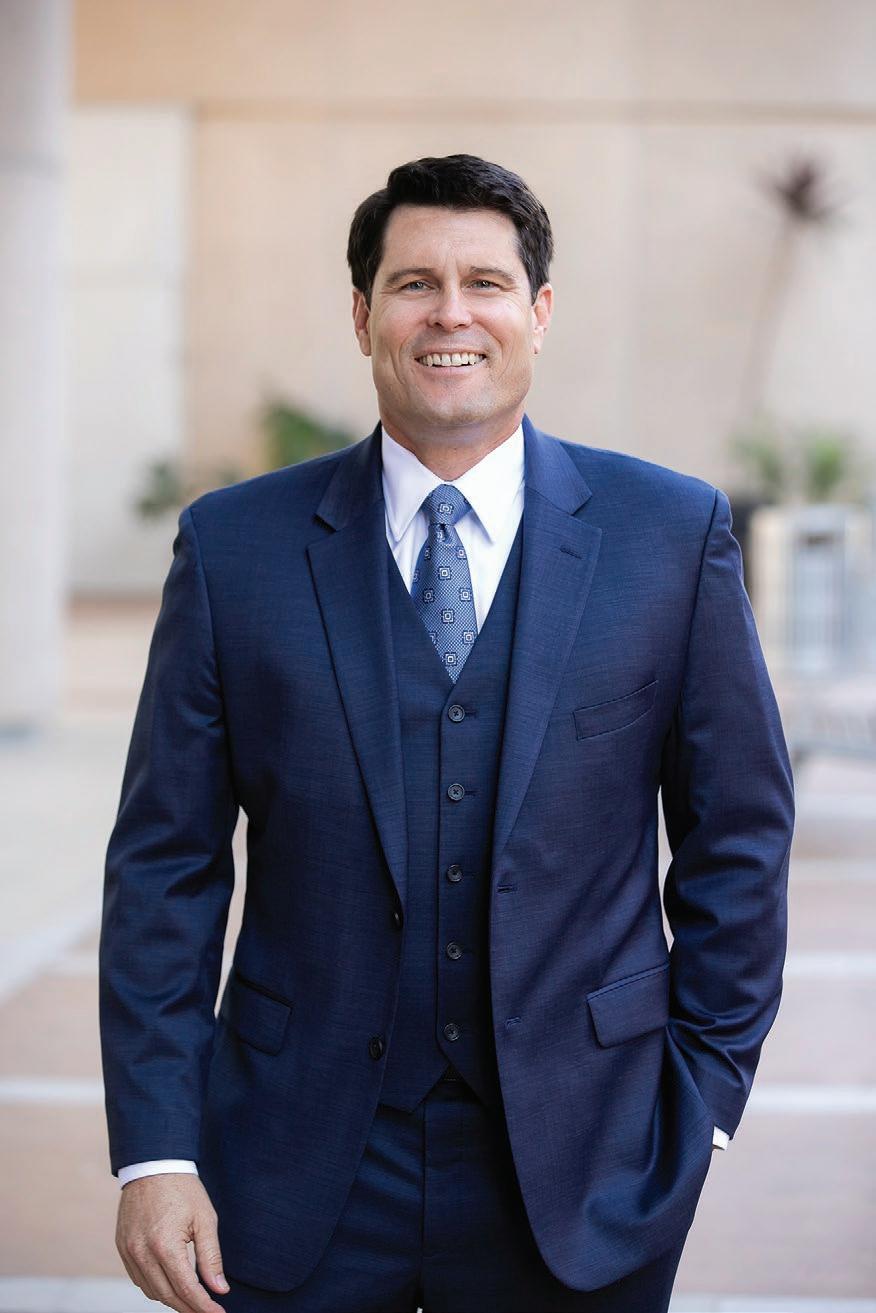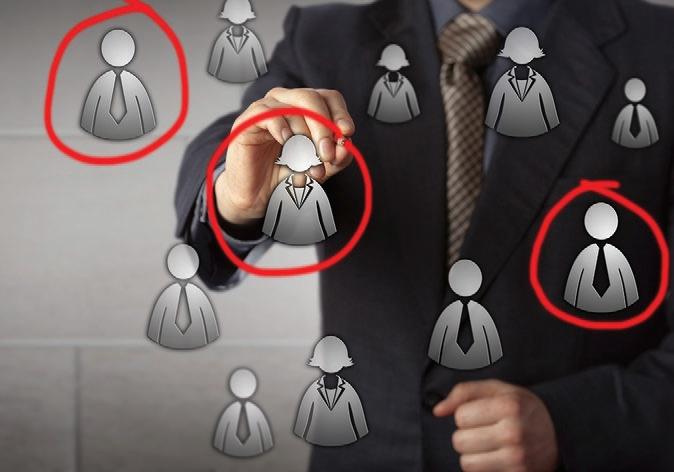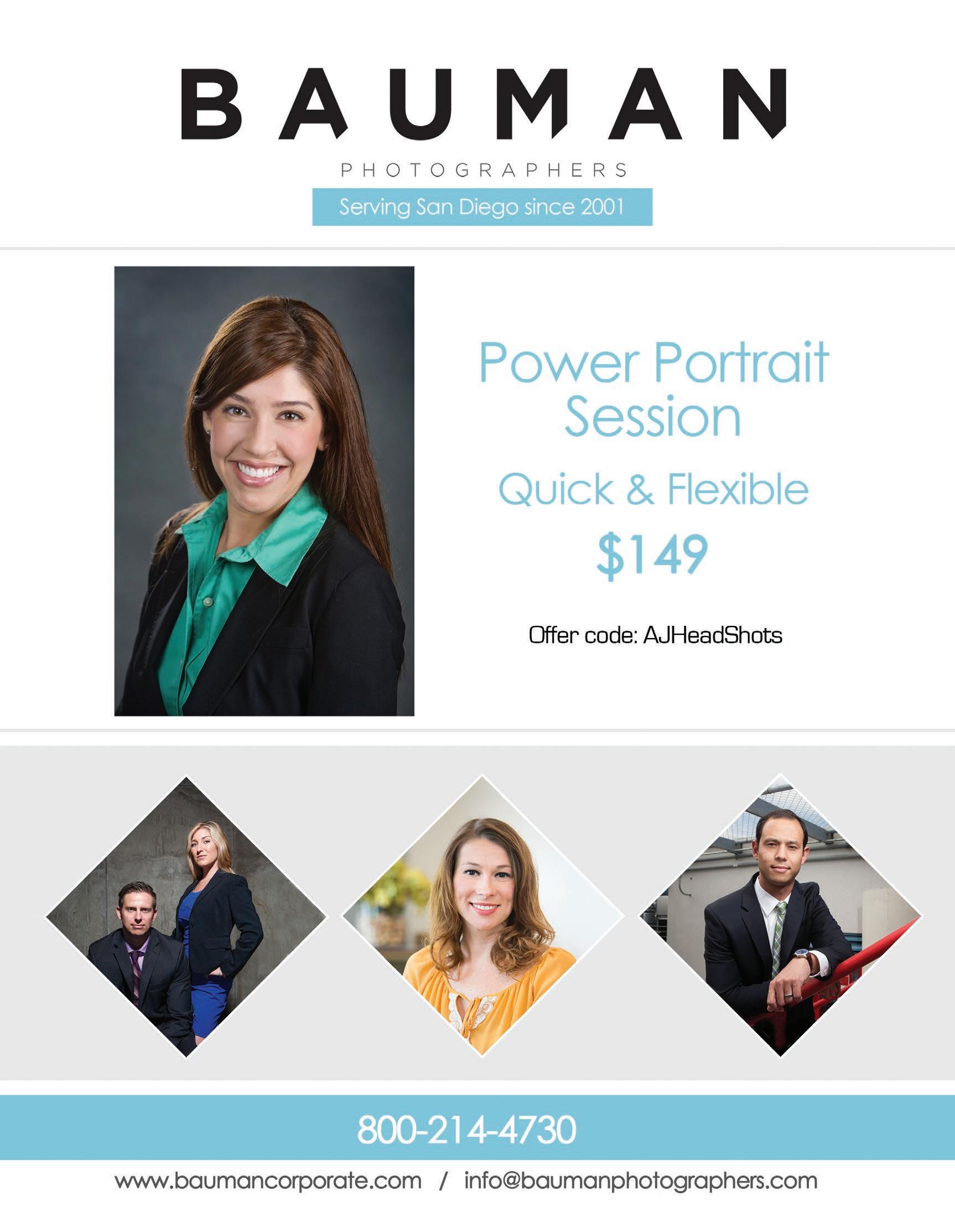
24 minute read
California Case Summaries
by Monty A. McIntyre, Esq.
These recent cases summarized by Monty A. McIntyre are from his publication California Case Summaries™. Monty prepares short summaries, organized by legal topic, of every new published California civil and family law case that California lawyers can subscribe to on a monthly, quarterly or annual basis. For more information go to https://californiacasesummaries.mykajabi.com. A California civil trial lawyer since 1980 and a member of ABOTA since 1995, Monty serves as a mediator, arbitrator and referee with ADR Services, Inc. handling cases in the areas of business, elder abuse, employment/wage & hour, insurance bad faith, legal malpractice, medical malpractice, personal injury, real property and wrongful death. To schedule a matter, contact Monty’s case manager Christopher Schuster at ADR Services, Inc. at (619) 233-1323 or christopher@adrservices.com.
CALIFORNIA SUPREME COURT
Evidence Mathews v. Becerra (2019) _ Cal.5th _ , 2019 WL 7176898: The California Supreme Court reversed the trial court’s order sustaining a demurrer, without leave to amend, to plaintiffs’ complaint alleging that the amended and expanded definition of the Child Abuse and Neglect Reporting Act’s (CANRA; Stats. 1987, ch. 1459.) term “sexual exploitation”, approved in Assembly Bill 1775, violated the plaintiffs’ patients right to privacy under the state and federal Constitutions. The California Supreme Court held that plaintiffs had asserted a cognizable privacy interest under the California Constitution and their complaint survives demurrer. This holding does not mean the reporting requirement is unconstitutional. It means only that the burden shifts to the state to demonstrate a sufficient justification for the incursion on privacy as this case moves forward. The case was remanded for further proceedings to determine whether the statute’s purpose of protecting children is actually advanced by mandatory reporting of psychotherapy patients who admit to possessing or viewing child pornography. (December 26, 2019.)
Probate Barefoot v. Jennings (2020) _ Cal.5th _ , 2020 WL 372523: The California Supreme Court reversed the Court of Appeal decision that had interpreted Probate Code section 17200(a) to only allow a currently named beneficiary to file a petition challenging the validity of disinheriting amendments in probate court on grounds such as incompetence, undue influence, or fraud. The California Supreme Court ruled that the Probate
22 Attorney Journals San Diego | Volume 199, 2020 Code grants standing in probate court to individuals who claim that trust amendments eliminating their beneficiary status arose from incompetence, undue influence, or fraud. The Supreme Court did not decide whether an heir who was never a trust beneficiary has standing under the Probate Code to challenge the trust. (January 23, 2020.)
CALIFORNIA COURTS OF APPEAL
Appeals PG&E “San Bruno Fire” Cases (2019) _ Cal.App.5th _ , 2019 WL 6888248: The Court of Appeal dismissed an appeal challenging the trial court’s allocation of attorney fees and costs after the settlement of consolidated San Bruno Fire Derivative Cases against PG&E. The settlement agreement provided that settling plaintiffs’ counsel would be paid in the aggregate $25 million in attorney fees and $500,000 in costs. The Court of Appeal dismissed the appeal because the operative settlement agreement unequivocally deemed the trial court’s allocation determination to be final and not subject to appellate review. (C.A. 1st, December 18, 2019.)
Arbitration Fabian v. Renovate America, Inc. (2019) _ Cal.App.5th _ , 2019 WL 6522978: The Court of Appeal affirmed the trial court’s order denying defendant’s petition to compel arbitration. The trial court properly denied the petition. Defendant offered no evidence about the process used to verify plaintiff’s electronic signature via DocuSign, including who sent plaintiff the contract, how the contract was sent to her, how plaintiff’s electronic signature was placed on
the contract, who received the signed contract, how the signed contract was returned to defendant, and how plaintiff’s identification was verified as the person who actually signed the contract. Defendant’s DocuSign authentication argument was therefore unsupported and unpersuasive. Moreover, by not providing any specific details about the circumstances surrounding the contract’s execution, defendant’s declaration offered little more than a bare statement that plaintiff “entered into” the contract without offering any facts to support that assertion. (C.A. 4th, filed November 19, 2019, published December 4, 2019.)
Philadelphia Indemnity Ins. Co. v. SMG Holdings, Inc. (2020) _ Cal.App.5th _ , 2019 WL 7790891: The Court of Appeal reversed the trial court’s order denying a petition to compel arbitration. Plaintiff’s insurance policy was issued to Future Farmers of America for an event it was holding inside the Fresno Convention Center. Future Farmers licensed the use of the convention center from defendant, its property manager. As part of the license, Future Farmers agreed to obtain coverage for itself and to name defendant as an additional insured. The policy provided coverage for “managers, landlords, or lessors of premises” as well as for any organization “as required by contract” and also contained an arbitration clause for coverage disputes. The Court of Appeal reversed the trial court and held defendant could be compelled to arbitrate. Defendant was an intended third party beneficiary to the contract. Defendant was estopped from claiming it was not subject to arbitration because it had previously tendered a request for defense and indemnity to plaintiff. Finally, the arbitration agreement encompassed the dispute at issue. (C.A. 3rd, filed December 31, 2019, published January 28, 2020.)
Attorney Fees Hance v. Super Store Industries (2020) _ Cal.App.5th _ , 2020 WL 373070: The Court of Appeal reversed the trial court’s order awarding class action attorney fees and dividing them in accordance with an alleged fee division agreement between the attorneys. The trial court abused its discretion by enforcing the fee division agreement because the undisputed facts showed a clear violation of former rule 3-410, requiring disclosure to potential clients that one of the attorneys had no malpractice insurance, and this rendered the fee agreement unenforceable. The matter was remanded for the trial court to determine whether the uninsured lawyer should recover compensation for his attorney services on a quantum meruit basis, and, if so, how much he should recover. (C.A. 5th, January 23, 2020.)
Civil Code Hensel Phelps Construction Co. v. Super. Ct. (2020) _ Cal. App.5th _ , 2020 WL 370445: The Court of Appeal denied a writ of mandate seeking an order directing the trial court to vacate its order denying petitioner’s motion for summary judgment in an underlying construction defect lawsuit. Petitioner argued that the plaintiff’s construction defect claim was barred by the 10-year statute of limitations in Civil Code section 941. Petitioner was the general contractor on a project. Petitioner argued that substantial completion under the statute had the same meaning as substantial completion in its construction contract with the developer. The construction defect plaintiff, however, was not a party to that contract. The Court of Appeal ruled that petitioner offered no authority for its novel proposition that certain parties may, by contract, conclusively establish the date when a limitations period begins to run on another party’s cause of action. Moreover, petitioner did not show that the statute should be interpreted to adopt the provisions of the construction contract. (C.A. 4th, January 22, 2020.)
Civil Procedure Dalessandro v. Mitchell (2020) _ Cal.App.5th _ , 2019 WL 6872301: The Court of Appeal affirmed the trial court’s order denying judgment creditor’s motion to compel production of documents and imposing $3,456.70 in sanctions against judgment creditor’s attorney for discovery abuses. The Court of Appeal ruled the post-judgment order was not an appealable order but treated the appeal as a writ petition. The trial court properly denied the motion to compel, finding service of the demand to be ineffective because there was no postage affixed to the envelope. The trial court properly issued sanctions for abuse of the Discovery Act (Code of Civil Procedure, section 2023.010 et seq.). For such sanctions, there was no requirement for a party to meet and confer with the opposing party to alert him to defects in his discovery requests, particularly when they were not validly served. Nor was the trial court required to make a finding of a lack of substantial justification. Finally, a separate motion was not required, nor was a separate hearing on discovery sanctions. (C.A. 2nd, filed December 17, 2019, published January 3, 2020.)
Torts Loeb v. County of San Diego (2019) _ Cal.App.5th _ , 2019 WL 6838736: The Court of Appeal affirmed the trial court’s order granting a nonsuit in defendant’s favor on the issue of trail immunity (Government Code, section 831.4.). Plaintiff sued for personal injuries she allegedly sustained when she tripped on an uneven concrete pathway in a park. The trial court had previously denied motions for summary judgment on the basis that disputed facts existed regarding whether the pathway was used for recreational purposes. However, when plaintiff conceded during argument over the proposed special verdict forms that the pathway was used, at least in part, for recreational purposes, the trial court properly granted the nonsuit. (C.A. 4th, filed November 19, 2019, published December 16, 2019.) n
Turn Negatives into Positives Using the Contrast Principle

by Trey Ryder
No lawyer has all positive qualities. When prospects think about hiring your services, they see both strengths and weaknesses.
Positive qualities that distinguish you from other lawyers are your competitive advantages. Negative qualities are your competitive disadvantages.
Naturally, you hope prospects conclude that your positives outweigh your negatives. And to help make your case, you try to neutralize negatives, so prospects think they are not important. Still, you can’t be sure what impact those negatives will have on your overall presentation. Here is your marketing challenge: How do you take negative aspects of your services and change them into positives so the negatives don’t cause your prospect to hire another lawyer? In his book, Influence (Morrow, 1984), psychology professor Robert Cialdini discusses principles that persuade people at the subconscious level. One of these, the contrast principle, allows you to change how prospects perceive facts. The contrast principle says: You can change how a person perceives something by changing the event that precedes it.
Since prospects’ perceptions are their reality, when you change their perception, you change what they believe is true. Here is how the contrast principle works. (Yes, you can try this at home): Prepare three buckets of water. One with cold water. One with hot water. And one with water at room temperature. Place one hand in the cold water and your other hand in the hot water. Then at the same time, place both hands into the room temperature water.
24 Attorney Journals San Diego | Volume 199, 2020 Your surprise illustrates the contrast principle. The hand that was first in cold water now feels like it is in hot water. And the hand that was in hot water now feels like it is in cold water. Yet, you can plainly see both hands are in the same water.
How each hand perceives the room-temperature water depends on the event that preceded it, namely whether your hand was first placed into water that was cold or hot. Another example: A man goes into a fashionable clothing store and tells the clerk he wants to buy a three-piece suit and a sweater. If you were the clerk, which would you show him first?
The contrast principle says always sell the more costly item first. Because after the man buys the suit, the cost of a sweater —even an expensive sweater—will seem small by comparison. If the clerk first showed the man a $500 sweater, the man might hesitate because that sounds expensive for a sweater. But if the man had just purchased a $2000 custom-tailored suit, $500 for a sweater does not seem out of line.
How the man perceives the price of the sweater changes depending on whether it is the first item he considers, or whether he first buys the expensive suit. Now, to your law practice: Identify something you believe prospects perceive negatively about you or your services. To make it easy, let’s use your fee. If you want your prospect to perceive your fee as fair and reasonable, before you state your fee, quote something much higher. Then when your prospect hears your fee, he will perceive it as lower than he would have had you not quoted the higher number.
EXAMPLE #1: Wrong: “Mr. Jones, I can prepare your estate plan for $12,000.” Mr. Jones, in shock, thinks, “$12,000! That’s more than I paid for my first house!” (This is an old example, when estate taxes were a bigger problem than they are today.) Right: “Mr. Jones, this estate plan will save your family over $200,000 in federal estate taxes. I can prepare this estate plan for you and your family for just $12,000.” Now Mr. Jones thinks, “Not much at all compared with the amount of taxes my family will save. What a bargain!”
EXAMPLE #2: Wrong: “Ms. Smith, I can represent you in your injury claim and my fee will be one third of the recovery.” Ms. Smith thinks, “This lawyer gets one third of my money!” Right: “Ms. Smith, to handle an injury claim like yours, some lawyers charge as much as 40 percent of the recovery, and even 50 percent if the case goes to trial. But, Ms. Smith, I’ll be pleased to represent you—and aggressively protect your interests—for just one third of the amount we collect.” Ms. Smith thinks, “This lawyer is much more generous than those other greedy lawyers.” The contrast principle holds true for any information you need to disclose, whether it is your fee, turnaround time for projects, even the number of years your client might spend in prison.
“Mr. Criminal, most people who commit armed robbery get 10 to 15 years in state prison. The district attorney has offered us a plea bargain that will make you eligible for parole in just five years. I recommend that you accept this plea bargain.” Five years sounds short after you quote 10 to 15 years. But five years would have sounded like a long time if you had not quoted the other numbers first.
“Ms. Client, under normal circumstances I would need three to four weeks to complete this project. But I understand this matter is a priority for you, so I promise to complete it and have it on your desk within ten days.” By itself, ten days might seem like a long time, but not when first compared with three to four weeks.
When you reach the point in your discussion where you must disclose a fact that might be perceived as negative, describe something more extreme in the preceding sentence. Then your prospect will perceive the information you disclose as more reasonable. In fact, you might turn a competitive disadvantage into an advantage based simply on how you present it. n
Trey Ryder shares his marketing method with lawyers through a wide range of publications. In addition, he writes and publishes his free e-zine, The Ryder Method™ of Education-Based Marketing. And he maintains the Lawyer Marketing Advisor at www.treyryder.com. He can be reached at: trey@treyryder.com
TOP 1% OF CALIFORNIA’S MOST SUCCESSFUL FIRE LAW FIRMS We represent thousands of individuals all over the State of California and have recovered over $750,000,000 on behalf of our clients. We have the experience and the resources to handle any complex case.
WHY PARTNER WITH OR REFER CASES TO SINGLETON LAW FIRM? 1. We Put Clients First 2. We Have Unmatched Experience Litigating Against Utility Companies 3. We Have the Necessary Resources To Maximize Results For Our Clients

*Generous Referral Fees paid consistent with State Bar Rules
Singleton Law Firm 450 A Street, 5 th Floor, San Diego, CA 92101 (619) 771-3473 | info@slffirm.com
8 ADDITIONAL OFFICES LOCATED THROUGHOUT CALIFORNIA: VENTURA, SAN FRANCISCO, SACRAMENTO, SANTA ROSA, MENDOCINO, CLEARLAKE, BUTTE & CALAVERAS
7 Things You Must Know Before Starting Your Own Firm

by Valerie McConnell
Iwas in my seventh year of practice and suffering from a classic case of burnout when I convinced myself that I would be happier at a small firm. I daydreamed about setting the litigation strategy for all of my cases without worrying about my decisions being overruled by the BigLaw bureaucracy. So, I paid off my law school debt and left one of the largest law firms in the world to join a law firm that employed exactly two people. But I soon learned that the world of small firms and solo practitioners was not what I thought it would be.
I used my own hard-learned lessons from small firm life, as well as the advice I received from colleagues who started their own firms, to compile a list of do’s and don’ts for anyone who is thinking about going solo.
Don’t underestimate the value of legal support personnel
Do you know how to file documents with the court? Or how to format your legal documents exactly according to your court’s local rules? Or how to bates-stamp documents or redact confidential material? If your answer is “no” or “I hate that stuff,” then you may want to think twice about starting your own firm. After I left BigLaw (and an amazing team of legal support personnel), I quickly discovered that proof-reading, citechecking, formatting, and filing legal briefs on PACER or with your local state court is a ton of work. It can take hours to finalize and file a simple motion. Don’t get me started
26 Attorney Journals San Diego | Volume 199, 2020 on how long it takes to file a brief with copious exhibits or text that needs to be redacted or filed under seal. And going through discovery (collecting documents, bates-stamping, redacting, etc.) without a dedicated legal support team is, frankly, terrible.
So, if you want to go solo, be prepared to do all of those tasks entirely by yourself—or hire a fantastic administrative assistant or paralegal to help you.
Be prepared to work hard
Big law firms have armies of people that handle all aspects of a successful practice: people who promote the firm to bring in business, people in charge of billing and collections so that the firm actually gets paid, people in charge of office management and IT infrastructure so that the firm has working computers, Internet, and everything else needed to practice law in the 21st century, legal support personnel to handle time-consuming administrative tasks (see No. 1 above) and, of course, the attorneys doing the actual billable work. When you hang out a shingle, you have one person to do all of that.
That observation may sound obvious, but when I joined a small firm, I was floored by how much time we spent on tasks besides practicing law. And since practicing law is already time-consuming, adding business development and generating invoices creates a very long to-do list.
Don’t get burned out
While you will need to work hard to succeed as a solo practitioner or small firm attorney, you still need to eat, sleep, and stay sane. But when you work for yourself, work can easily take over your life. There is no one to cover for you when you are sick, no office policy on holidays or vacation days, and no clear separation between your work life and your home life. Also, when you work for yourself, there is a strong financial incentive to work all the time, as every dollar that the firm gets is money in your pocket. Under those circumstances, it can be easy to fall into a pattern where you are working all the time. However, over-extending and exhausting yourself is a recipe for burnout–and also increases the risk of mistakes and possible malpractice. Be sure to take care of yourself so that you stay sharp and motivated.
Get a mentor
One of the best aspects of working in a law firm is that you have colleagues that you can speak to about problems in your cases. You can grab lunch with a fellow associate and bounce ideas off of them. You can pick the brain of a partner at your firm and hear their thoughts on a particular judge or case strategy. Your firm also provides a built-in audience that you can use to moot an important hearing. All of that goes away when you start your own practice.
You need a replacement for that support structure, which is why you need a mentor. Find an attorney that you can talk to on a regular basis about any thorny issues in your practice. The best mentor has more experience than you, but just talking to another attorney can help provide the clarity and perspective you need to figure out a solution to a problem.
Don’t be an island
As a natural introvert, I hate to say this, but you cannot practice law completely by yourself. Even if you have a solo practice, you need to network with other attorneys. Networking leads to referrals, which leads to clients and income. Many attorneys find friendships (and referrals) by going to conferences or joining a local bar association. Or if you (like me) have trouble making small talk at a cocktail party full of attorneys, get involved in pro bono work. I made several friends and received a number of referrals by volunteering alongside other attorneys for a cause I cared about.
Your credibility is everything
For better or worse, having the power and prestige of a big firm behind you can help you look more credible in the courtroom. But when you hang out a shingle or work for a small firm, your credibility rests entirely on the quality of your legal representation. You may find (as I did) that your legal arguments are subject to greater scrutiny and skepticism by the courts and opposing counsel when you strike out on your own. Without a big law firm brand behind you, you need to take great care to build and maintain your credibility. A judge or opposing counsel might be willing to give an attorney from a top firm the benefit of the doubt, but a small firm attorney rarely gets that benefit. If you are thinking about rushing through your legal research or filing a less-than-stellar brief with the court, think again. Although you may find that you are pressed for time and resources (see above), you need to triple-check your briefs for miscited cases, flawed arguments, and other landmines. Once your credibility is lost with a judge, it is almost impossible to gain back.
Don’t buy things you don’t need
Watching what you spend is sound life advice, but you need to be especially careful about money when you are starting your own firm. If no new clients walk through the door, or if a case settles for far less than expected, or if a client simply refuses to pay you, you don’t want to be unable to pay your rent.
To protect yourself against the lean times, make sure that you are only buying what you actually need to practice law. For example, to save on rent, consider an inexpensive office-sharing arrangement, or work from home and meet clients at their offices. And instead of shelling out thousands of dollars a year for a Westlaw or Lexis subscription, take advantage of free and affordable legal resources. One great list of those resources can be found here: casetext.com/lexiswestlaw-guide n
Valerie McConnell is a litigation attorney with experience in a wide range of practice areas, focusing in particular on intellectual property issues and is licensed in California and Missouri. Learn more by visiting www.casetext.com.

I just stole something for you … As you know, my job gives me behind-the-scenes insight into how some of the world’s greatest marketers handle “selling” problems in different ways. It’s a great education that never quits.
And recently I saw a tremendous client reactivation idea ... tremendous because it works like magic and is rarely used in marketing efforts.
Credit goes to Ferd Nauheim. I recently bought his book, Salesman’s Complete Model Letter Handbook, in which he shares many overlooked opportunities for communicating with clients and prospects. The book is especially helpful for those times when you want to contact someone but can’t figure out what to say without sounding like a pushy salesman.
Anyway, I stole one of Nauheim’s letters and reworked it for you. Don’t worry, though, I’m certain he doesn’t mind. If fact, he states at the beginning of his book, “In many cases, salesmen and sales managers will be able to use letters in this book with little or no change. But even where a complete change is required to fit a particular set of circumstances, the model letters point the way.”
In one section, Nauheim shares letters of appreciation to customers. The one I revised for you is designed to reactivate lost clients or those who haven’t bought from you in a long time.
Use the following letter (right) as a model. Simply copy the text to your letterhead, make adjustments to fit your law firm, and then mail—with a stamp on a handaddressed envelope—the letters to your lost clients. (Watch your mailbox. You may even see one of these letters from me.)
Sure, this letter isn’t perfect. You could do things differently. And you may even think the text won’t work for you.
But that’s not the point. The fact to remember is you likely have a list of lost clients that hold hidden profit opportunities. Contact these people now.
Please feel free to share this message with the people in your network. n
An Overlooked List That Holds Hidden Profit Opportunities
by Tom Trush
Dear (enter client’s first name),
It’s been some time since I expressed my heartfelt thanks. While looking at my calendar earlier this week, I thought about the thank-you notes I should send to two new clients. Then it suddenly occurred to me that, while saying thanks to folks who just bought from me may be good business, I never took the time to express my sincere appreciation to you for your loyalty over the years.
I’m concerned that something I did caused you to stay away for so long. If so, please contact me at (enter phone number) or (enter email address) so I can correct the problem. Then again, maybe life’s events just got in the way. Whatever the case, I suppose I’m no more guilty than most people. We are so concerned with day-to-day business needs that we seldom take time out to show the great gratitude we feel for our most important business friends ... those who keep coming back and who thoughtfully send others to us. I appreciate your continuing support. Gratefully, (enter your name/signature)
P.S. (Use this space to share an appealing offer and/or provide a strong reason to respond).
Tom Trush is a Phoenix, Ariz.-based direct-response copywriter who helps entrepreneurs and executives craft lead-generating marketing materials. Pick up his latest book, Escape the Expected: The Secret Psychology of Selling to Today’s Skeptical Consumers, for free (just cover shipping) at www.writewaysolutions.com/blog/free-book-offer/.
We Know Marketing Like You Know the Law
Let us “do the time” to get your project right! • Writing for the layperson • Putting together a presentation • Developing a marketing strategy • Sprucing up your website • Designing an ad, booklet, flyer or brochure • Establishing a better logo, mission statement or tagline


















UNRIVALED
JURY VERDICTS
SETTLEMENTS
PERSONAL SERVICE

REFERRAL FEES
PANISH SHEA & BOYLE is happy to discuss how we may assist you in your case. Please contact the Honorable Judge Peter Polos (Ret.) for more information at polos@psblaw.com.




